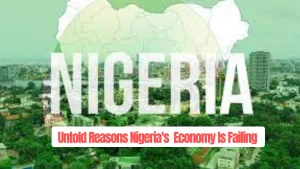You may have heard so much about why the Nigerian economy consistently falling south, but have not settled down to see what you’re not being told.
It has become necessary that most people see and know better to help them decide in the days of hardship and more hardship that is to come.
These are implications of failed regimes and failure to refocus the nation’s economy with a drastic will.

You see it may be true that Nigeria just like most other African countries faces economic challenges that are hampering development.
But what may not be true is that the resources needed to change the present economic reality in Nigeria are scarce. This is because Nigeria’s rich resources and human capital more than triple what some thriving nations possess.
And they are economically far better than Nigeria, even with over 200 million population.
Economic problems are problems the government tries to solve to satisfy the yearnings and needs of the country which are unlimited.
Have You Read: How Value-driven Financial Institutions Can Create Strong Economy
In this article, we shall look at a few economic challenges hampering growth and development in Nigeria.
Major Challenges Affecting Growth In Nigeria
-
Insecurity
Is it possible for business to thrive and the economy to gain stature when a nation is plagued with insecurity? The answer is no.
Most states in the North have been experiencing insecurity for the past two decades and the government has not been able to solve this problem.
Insecurity has led to a shortfall of food produce that is resulting in the hike of price of foodstuff as it is been experienced currently nationwide.
Farmlands have been deserted because of insecurity so the agriculture sector can not contribute adequately to the growth of the economy.
-
Corruption
Corruption is a hydra-headed monster that has eaten deep into the fabric of the nation. Politicians, contractors, and civil servants are all dipping their hands into the treasury.
According to an analyst, there is so much incentive to steal in Nigeria, and the law or the judicial system in Nigeria has feelings and emotions.
Corrupt practices that are geared toward embezzlement have made it difficult for the economy to grow and impact the lives of citizens.
This monster rather than building the economy destroys it
Unemployment
The majority of Nigerian youths are trying to Japa, not because they are happy to but because there is the feeling that their life might not amount to anything staying back in Nigeria.
Why? There are no jobs, and graduates roaming the streets aimlessly. They can’t feed properly and get meaningful employment.
Government after government promises to create jobs which they don’t do, but when they do their families are the first to be employed.
But traveling abroad, you earn dollars whose value is higher than the naira and enjoy constant power supply and interconnectivity.
So the government loses tax revenue from the frustrated youths who will now do anything available to survive.
-
Inflation
The economy is discouraging manufacturers and forcing multinationals to pack up their businesses and leave Nigeria.
According to the National Bureau of Statistics (NBS), inflation currently stands at 28.92%, and it is affecting virtually every business in the nation.
From the manufacturing sector to health, tourism, real estate, telecoms, and every other sector within the economy.
Do not forget that roads are bad, the exchange rate is fluctuating and posing a separate challenge on its own to business owners.
-
Crude theft oil and pipeline vandalism
Nigeria is a major crude oil producer in Africa but in the last 12 months, its production has been very inconsistent.
The nation’s inability to meet its OPEC quota has seen Nigeria lose out on revenue generation severally.
You May Also Like: See Why Moghalu Blames APC Over Current Nigeria Economy
You see the factors responsible for Nigeria’s inability to meet the OPEC quota are crude oil theft, corruption, and pipeline vandalism among others.
Nigeria’s economy would have been very buoyant if corruption had not become a mainstay in government.
Other challenges include inconsistent economic policies, inadequate power supply, the nature of the Nigerian market, and the social gap.
The federal government is creating 100,000 jobs

